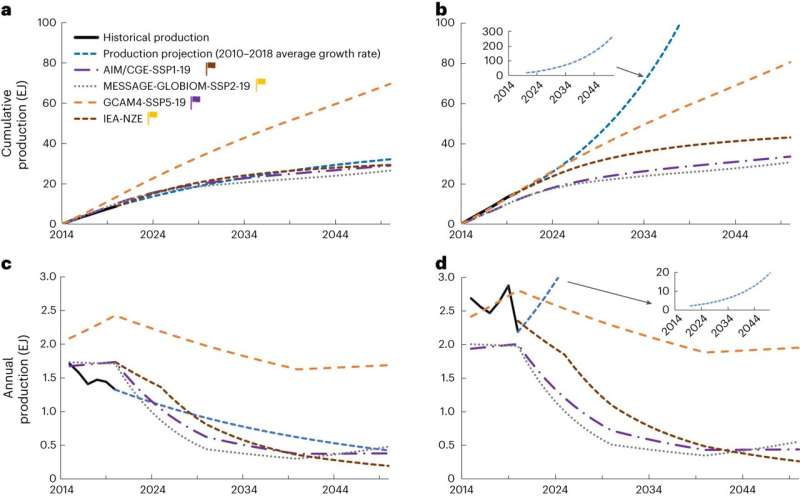This article has been reviewed according to Science X's editorial process and policies. Editors have highlighted the following attributes while ensuring the content's credibility:
fact-checked
peer-reviewed publication
trusted source
proofread
Climate progress tracker reveals fossil fuel producers' shortfall

More than half of the world's top fossil fuel producers will fail to meet climate targets unless they ramp up decarbonization plans, according to an international team led by The University of Queensland.
An assessment methodology developed by researchers at UQ, Oxford University, Princeton University and the Climate Accountability Institute has tracked the companies' compliance with the Paris Agreement using publicly available data. The work is published in the journal Nature Climate Change.
Dr. Saphira Rekker from UQ Business School said more than 60% of the top 142 oil, gas and coal companies weren't aligned with targets to limit global warming to 1.5°C above pre-industrial levels.
"We assessed the companies' outputs since 2014 and found they were on track to exceed Paris compliant production of oil by 42%, gas by 53% and coal by 68% by 2050," Dr. Rekker said.
"Of the five Australian companies we assessed in the study, two are currently within production budgets across the fossil fuels they produce."
The production budgets were set by translating scenarios consistent with the Paris Agreement to a company level, determining the amount of fossil fuels they could produce to be compliant.
"Phrases like 'Paris aligned' and 'Paris compliant' are being thrown around everywhere right now," Dr. Rekker said.
"But if we don't have a robust and reliable way of assessing progress, those phrases don't actually mean anything.
"Our goal is to help everyone understand the climate targets the companies have set, whether they align with the Paris Agreement, and the underlying assumptions that go with those targets, such as needing technologies like carbon capture and storage."
Dr. Chris Greig from Princeton University's Andlinger Center for Energy and the Environment said companies often announced climate targets but then continued with business as usual.
"When you make a commitment, you should have a credible plan to deliver; however, it's clear from our work that the paths several companies are taking fall very short of their pledges," Dr. Greig said.
The researchers' new method expands on their original approach, which measured the Paris compliance of utility and cement companies using a science-based test.
Dr. Matthew Ives from the Institute for New Economic Thinking at the Martin School, University of Oxford, said the fossil fuel method would make it more difficult for companies to get away with greenwashing.
"Some existing approaches have used metrics like carbon intensity that rely on difficult-to-source and often misleading data," Dr. Ives said.
"Other approaches have enabled companies to choose their own starting point for tracking progress, allowing them to erase unflattering historical emissions.
"With our approach, anyone and everyone can evaluate fossil fuel companies for their Paris compliance—it's much more straightforward."
Dr. Rekker said there were many pathways to Paris compliance, so the aim of the research wasn't to lecture the companies and sectors studied about the right and wrong ways to operate.
"Our tool also gives executives and other stakeholders a sense of the transition and reputational risks they might face if they overshoot their production budgets and don't course correct," she said.
Companies, policymakers, shareholders and the public can visit the researchers' Are You Paris Compliant website to access the company ratings and assessment tools.
More information: Saphira Rekker et al, Evaluating fossil fuel companies' alignment with 1.5 °C climate pathways, Nature Climate Change (2023). DOI: 10.1038/s41558-023-01734-0
Journal information: Nature Climate Change
Provided by University of Queensland



















